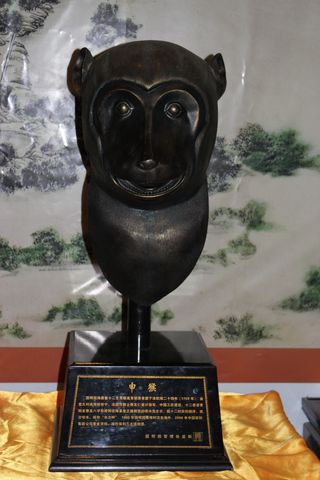All over China, the people are celebrating their most important holiday, the Chinese New Year. This year, the Year of the Monkey, the fifteen-day holiday officially began on February 7th. As is the custom, the celebrations actually started on the eve of the New Year with a cacophony of large and small, mostly random firework displays that will continue day and night—albeit sporadically at times—for just over two weeks, culminating with the beautiful Festival of Lanterns, on the 22nd.
For the Chinese, the New Year is a time to focus on family. Most businesses close for at least ten days so the owners and employees can spend time with their loved ones. It’s a particularly hectic time to travel in The Middle Kingdom, as over three hundred million people take to the roads, rails, and skies to return to their hometowns to visit their families. Given the number of travelers, the transportation infrastructure is severely stressed, and the millions of poor migrant workers who man China’s countless factories often face arduous journeys that can take more than a day each way.
Foreigners are advised by their Chinese friends to either stock up on food and other necessities (including earplugs!) or take the opportunity to travel elsewhere in Asia. (While many other Asian countries celebrate the lunar New Year, each country has its own unique traditions and some are more accommodating to tourists during the holiday than others.)
-----
As in the West, the Chinese zodiac consists of twelve signs, but unlike the Western zodiac, which features a different sign for roughly every month, the Chinese system features a different sign for every year. A person’s birth date determines their sign, or animal, and many, many Chinese believe an individual’s sign is a good predictor of their personality. For example, those born in the Year of the Monkey are said to be curious, vivacious, witty, inventive, and mischievous.
There are several versions of the story of how the Chinese zodiac was created. Most origin stories agree that the twelve animals of the zodiac were the first to cross the finish line in a race held by either Buddha or one of the emperors of ancient China. While the Western zodiac uses the position of the stars and planets to make predictions, the Chinese zodiac uses the relationship of the earth’s five elements—water, wood, wind, fire and metal.
-----
During our first tour of the Forbidden City after we moved to Beijing, our guide eagerly began pointing out the many stone carvings of Chinese zodiac animals and insisted my husband and I tell her our birthdays, so she could determine our signs. (In general, the Chinese are fervent believers in symbolism and are much more superstitious than Westerners.)
We soon learned that my husband is a Rabbit and I am a Rat. While our guide assured us we both have “good signs” and are well matched, I immediately forgot mine —accidentally on purpose—dismissing the whole concept of zodiac signs as a silly superstition. (After all, who wants to remember that they are a Rat?)
A month later, a close friend from New York came to visit. Our first outing was to The Forbidden City, where of course, our guide immediately asked us our birthdates. When she learned what year my friend was born in, she became very excited.
“You are a Dragon—ancient sign of the Emperor—best sign of all!” she declared gleefully again and again. “What year your husband was born?” she soon asked. When our guide heard his birthdate, she nearly jumped for joy. “Aaiyah! Your husband is a Tiger! He is adventurous and self-confident, a true leader! You are a power couple! The best combination! The best!” she declared, clapping her hands and bowing to my friend, clearly in awe.
When at last our guide turned to me and asked when I was born, I felt my heart sink. “Do you know what is your sign?” she asked, sizing me up with curious eyes.
“Well, I’m not really sure,” I mumbled, hoping that I had been mistakenly labeled a Rat. “Doesn’t it depend on exactly what day you were born?”
“You are correct!” she replied. “We go by the lunar calendar, so beginning of Chinese New Year is different every year. First day of the fifteen-day holiday can be in January or February. What month you were born in?”
“I was born in May,” I said, somewhat dejectedly, telling her the year.
“Oh, you are a Rat,” our guide declared matter-of-factly.
Even worse than being Taurus the Bull in the U.S., I thought.
“Why you are not happy? Rat is good! Rat is clever, smart, quick. It is good to be a Rat. We Chinese, we like Rats.”
I looked at my tall, beautiful, seemingly fearless friend. Of course she was born under the sign of the Emperor. She even carries herself like a regal Dragon—an exceedingly kind and thoughtful Dragon, but a Dragon nonetheless... But a Rat? Where did I go wrong?!
Seeing that I was not easily consoled, our guide asked what year my husband was born. Given that his birthday is in December, I secretly hoped that he was born in a rare cusp year, and that maybe he was somehow actually a Dragon, or at least a Tiger.
“Your husband is a Rabbit. Friendly, kind, good diplomat, very worth your trust. Also a good sign, like the Rat. You two make good couple.”
Well, he is all those good things and more, and Rabbits are pretty cute. And we are very compatible." I was starting to feel better.
True to the Chinese penchant for directness, our guide felt she just had to tell me more. “Of course the Rat and Rabbit are not so powerful and desirable as the Dragon and Tiger, but still, your signs are good together.”

-----
In the ensuing years, I have been asked what my sign is by countless Chinese in all walks of life. Believe it or not, I can absolutely confirm that the Chinese do seem to like Rats (or at least zodiac Rats.) And while many people have volunteered that the Rat is not their favorite sign, at least they appreciate the finer points of being a Rat. I’ve also learned to take comfort in the fact that no one has ever felt compelled to tell me what negative traits are common to Rats. In China, that really means something…




